Analyzing the Economic Consequences of Brexit for the UK and EU
VerifiedAdded on 2023/01/06
|9
|2591
|1
Report
AI Summary
This report examines the multifaceted economic impacts of Brexit on the United Kingdom and the European Union. It begins with a brief history of the EU, setting the stage for understanding the context of the UK's departure. The main body of the report delves into the challenges the UK faced as a member of the EU, including complex regulations and limited economic growth opportunities. Furthermore, it analyzes the positive and negative impacts of Brexit on both the UK and other member nations, particularly concerning trade services and economic conditions. The report concludes by summarizing the key findings and implications of Brexit, highlighting its influence on the UK's economic independence and the shifting dynamics within the EU. The document explores changes in trade practices, custom duties, and the acquisition of technologies, offering a comprehensive overview of the economic consequences of this significant political decision. This report is a student contribution available on Desklib, a platform offering AI-based study tools.
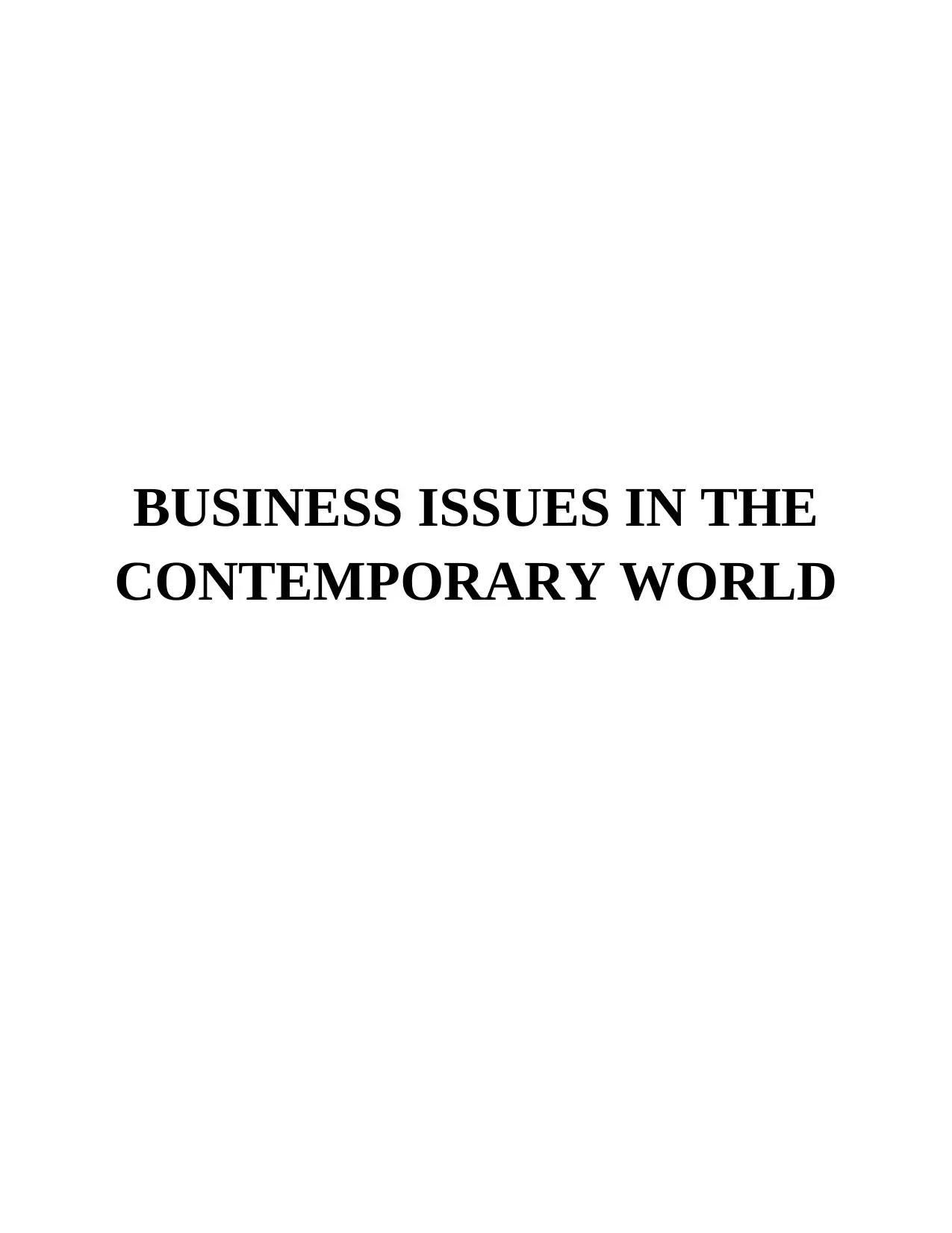
BUSINESS ISSUES IN THE
CONTEMPORARY WORLD
CONTEMPORARY WORLD
Paraphrase This Document
Need a fresh take? Get an instant paraphrase of this document with our AI Paraphraser
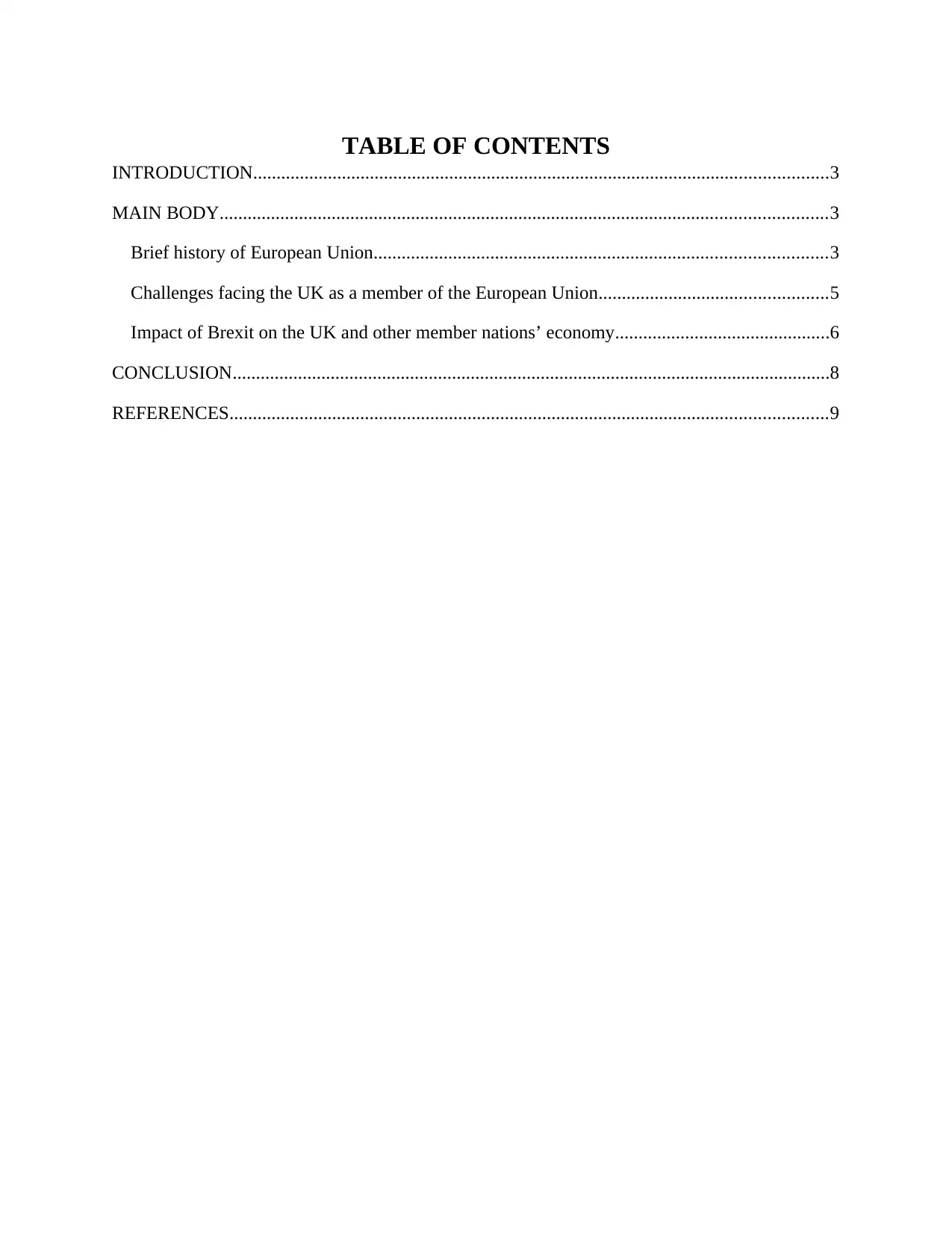
TABLE OF CONTENTS
INTRODUCTION...........................................................................................................................3
MAIN BODY..................................................................................................................................3
Brief history of European Union.................................................................................................3
Challenges facing the UK as a member of the European Union.................................................5
Impact of Brexit on the UK and other member nations’ economy..............................................6
CONCLUSION................................................................................................................................8
REFERENCES................................................................................................................................9
INTRODUCTION...........................................................................................................................3
MAIN BODY..................................................................................................................................3
Brief history of European Union.................................................................................................3
Challenges facing the UK as a member of the European Union.................................................5
Impact of Brexit on the UK and other member nations’ economy..............................................6
CONCLUSION................................................................................................................................8
REFERENCES................................................................................................................................9
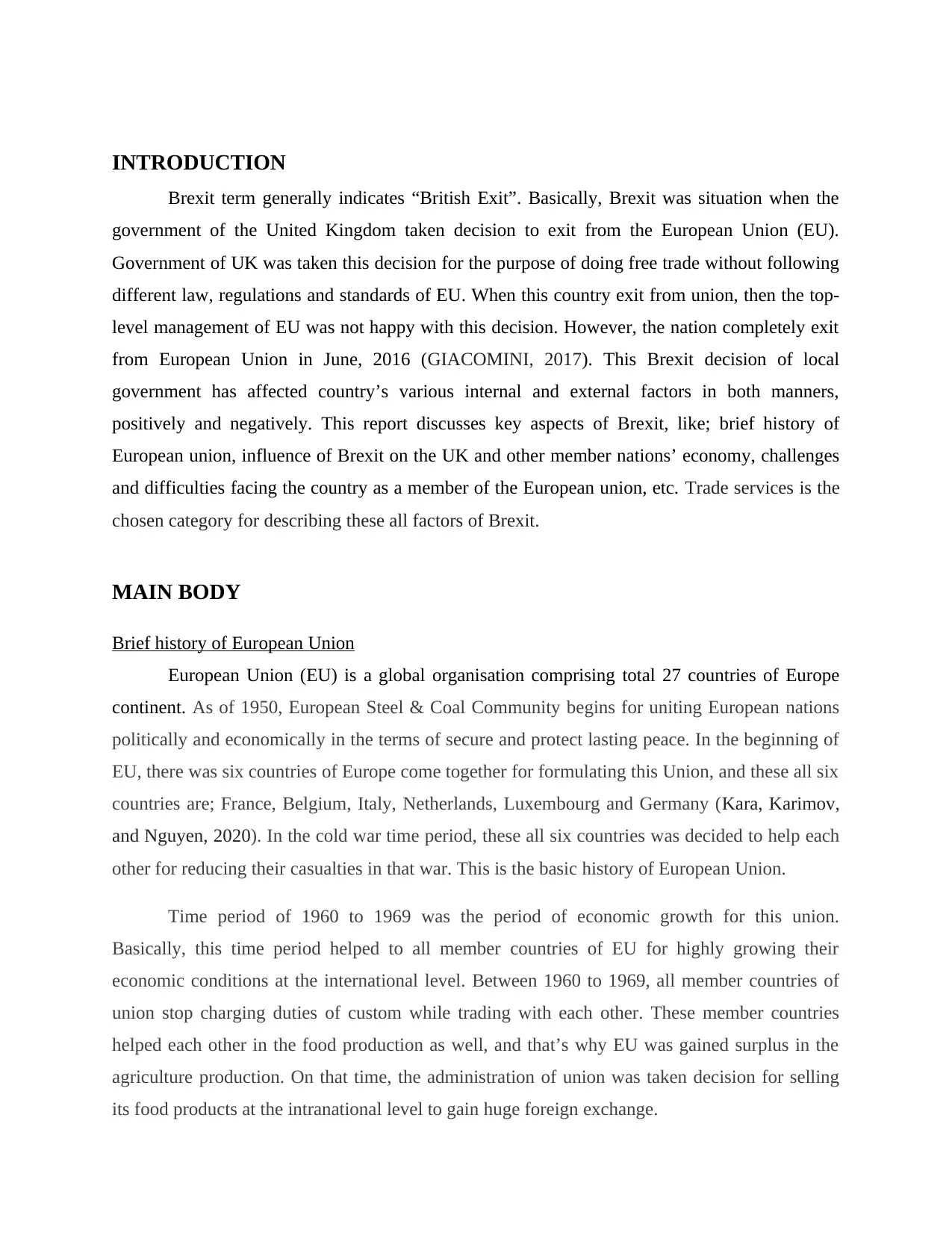
INTRODUCTION
Brexit term generally indicates “British Exit”. Basically, Brexit was situation when the
government of the United Kingdom taken decision to exit from the European Union (EU).
Government of UK was taken this decision for the purpose of doing free trade without following
different law, regulations and standards of EU. When this country exit from union, then the top-
level management of EU was not happy with this decision. However, the nation completely exit
from European Union in June, 2016 (GIACOMINI, 2017). This Brexit decision of local
government has affected country’s various internal and external factors in both manners,
positively and negatively. This report discusses key aspects of Brexit, like; brief history of
European union, influence of Brexit on the UK and other member nations’ economy, challenges
and difficulties facing the country as a member of the European union, etc. Trade services is the
chosen category for describing these all factors of Brexit.
MAIN BODY
Brief history of European Union
European Union (EU) is a global organisation comprising total 27 countries of Europe
continent. As of 1950, European Steel & Coal Community begins for uniting European nations
politically and economically in the terms of secure and protect lasting peace. In the beginning of
EU, there was six countries of Europe come together for formulating this Union, and these all six
countries are; France, Belgium, Italy, Netherlands, Luxembourg and Germany (Kara, Karimov,
and Nguyen, 2020). In the cold war time period, these all six countries was decided to help each
other for reducing their casualties in that war. This is the basic history of European Union.
Time period of 1960 to 1969 was the period of economic growth for this union.
Basically, this time period helped to all member countries of EU for highly growing their
economic conditions at the international level. Between 1960 to 1969, all member countries of
union stop charging duties of custom while trading with each other. These member countries
helped each other in the food production as well, and that’s why EU was gained surplus in the
agriculture production. On that time, the administration of union was taken decision for selling
its food products at the intranational level to gain huge foreign exchange.
Brexit term generally indicates “British Exit”. Basically, Brexit was situation when the
government of the United Kingdom taken decision to exit from the European Union (EU).
Government of UK was taken this decision for the purpose of doing free trade without following
different law, regulations and standards of EU. When this country exit from union, then the top-
level management of EU was not happy with this decision. However, the nation completely exit
from European Union in June, 2016 (GIACOMINI, 2017). This Brexit decision of local
government has affected country’s various internal and external factors in both manners,
positively and negatively. This report discusses key aspects of Brexit, like; brief history of
European union, influence of Brexit on the UK and other member nations’ economy, challenges
and difficulties facing the country as a member of the European union, etc. Trade services is the
chosen category for describing these all factors of Brexit.
MAIN BODY
Brief history of European Union
European Union (EU) is a global organisation comprising total 27 countries of Europe
continent. As of 1950, European Steel & Coal Community begins for uniting European nations
politically and economically in the terms of secure and protect lasting peace. In the beginning of
EU, there was six countries of Europe come together for formulating this Union, and these all six
countries are; France, Belgium, Italy, Netherlands, Luxembourg and Germany (Kara, Karimov,
and Nguyen, 2020). In the cold war time period, these all six countries was decided to help each
other for reducing their casualties in that war. This is the basic history of European Union.
Time period of 1960 to 1969 was the period of economic growth for this union.
Basically, this time period helped to all member countries of EU for highly growing their
economic conditions at the international level. Between 1960 to 1969, all member countries of
union stop charging duties of custom while trading with each other. These member countries
helped each other in the food production as well, and that’s why EU was gained surplus in the
agriculture production. On that time, the administration of union was taken decision for selling
its food products at the intranational level to gain huge foreign exchange.
⊘ This is a preview!⊘
Do you want full access?
Subscribe today to unlock all pages.

Trusted by 1+ million students worldwide
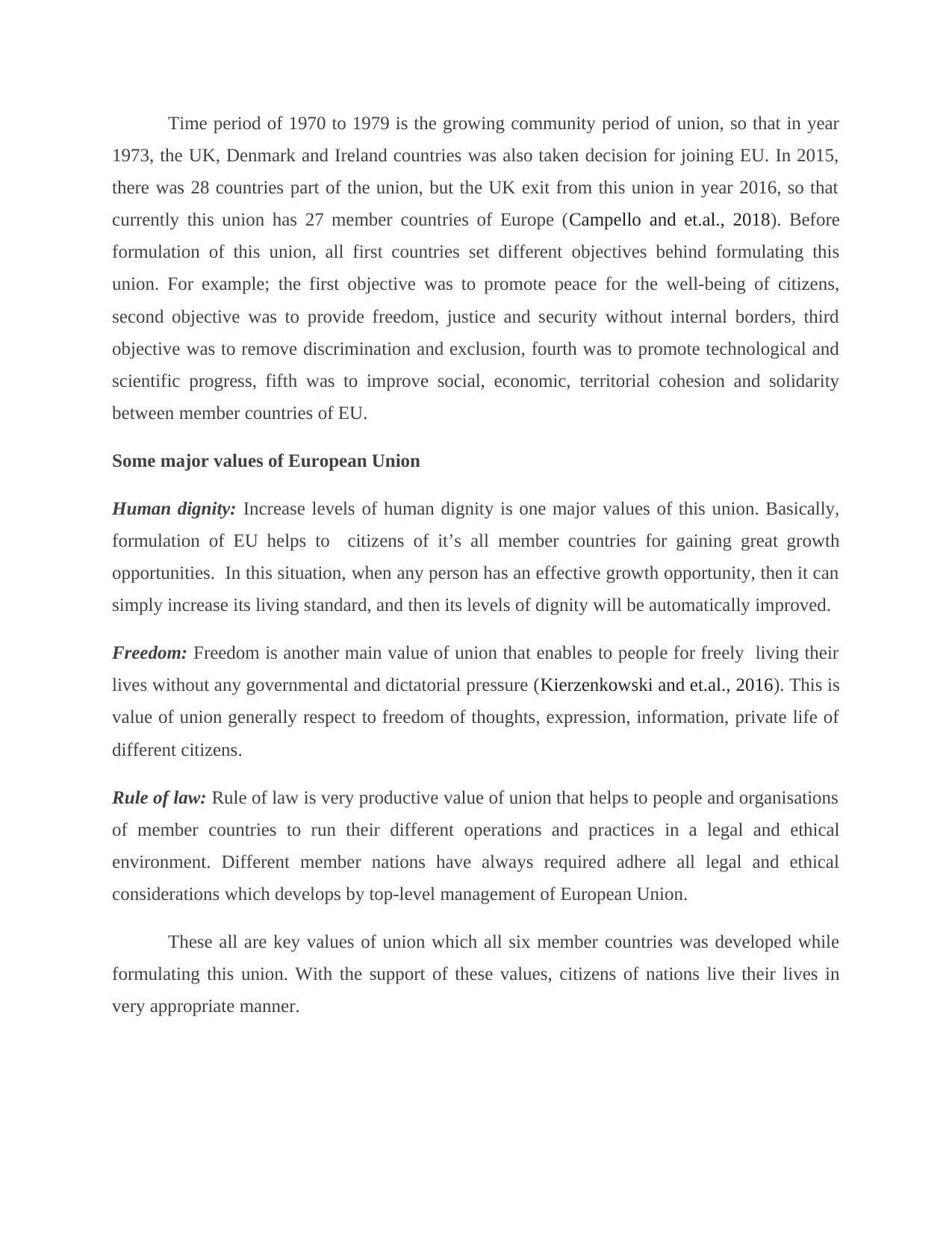
Time period of 1970 to 1979 is the growing community period of union, so that in year
1973, the UK, Denmark and Ireland countries was also taken decision for joining EU. In 2015,
there was 28 countries part of the union, but the UK exit from this union in year 2016, so that
currently this union has 27 member countries of Europe (Campello and et.al., 2018). Before
formulation of this union, all first countries set different objectives behind formulating this
union. For example; the first objective was to promote peace for the well-being of citizens,
second objective was to provide freedom, justice and security without internal borders, third
objective was to remove discrimination and exclusion, fourth was to promote technological and
scientific progress, fifth was to improve social, economic, territorial cohesion and solidarity
between member countries of EU.
Some major values of European Union
Human dignity: Increase levels of human dignity is one major values of this union. Basically,
formulation of EU helps to citizens of it’s all member countries for gaining great growth
opportunities. In this situation, when any person has an effective growth opportunity, then it can
simply increase its living standard, and then its levels of dignity will be automatically improved.
Freedom: Freedom is another main value of union that enables to people for freely living their
lives without any governmental and dictatorial pressure (Kierzenkowski and et.al., 2016). This is
value of union generally respect to freedom of thoughts, expression, information, private life of
different citizens.
Rule of law: Rule of law is very productive value of union that helps to people and organisations
of member countries to run their different operations and practices in a legal and ethical
environment. Different member nations have always required adhere all legal and ethical
considerations which develops by top-level management of European Union.
These all are key values of union which all six member countries was developed while
formulating this union. With the support of these values, citizens of nations live their lives in
very appropriate manner.
1973, the UK, Denmark and Ireland countries was also taken decision for joining EU. In 2015,
there was 28 countries part of the union, but the UK exit from this union in year 2016, so that
currently this union has 27 member countries of Europe (Campello and et.al., 2018). Before
formulation of this union, all first countries set different objectives behind formulating this
union. For example; the first objective was to promote peace for the well-being of citizens,
second objective was to provide freedom, justice and security without internal borders, third
objective was to remove discrimination and exclusion, fourth was to promote technological and
scientific progress, fifth was to improve social, economic, territorial cohesion and solidarity
between member countries of EU.
Some major values of European Union
Human dignity: Increase levels of human dignity is one major values of this union. Basically,
formulation of EU helps to citizens of it’s all member countries for gaining great growth
opportunities. In this situation, when any person has an effective growth opportunity, then it can
simply increase its living standard, and then its levels of dignity will be automatically improved.
Freedom: Freedom is another main value of union that enables to people for freely living their
lives without any governmental and dictatorial pressure (Kierzenkowski and et.al., 2016). This is
value of union generally respect to freedom of thoughts, expression, information, private life of
different citizens.
Rule of law: Rule of law is very productive value of union that helps to people and organisations
of member countries to run their different operations and practices in a legal and ethical
environment. Different member nations have always required adhere all legal and ethical
considerations which develops by top-level management of European Union.
These all are key values of union which all six member countries was developed while
formulating this union. With the support of these values, citizens of nations live their lives in
very appropriate manner.
Paraphrase This Document
Need a fresh take? Get an instant paraphrase of this document with our AI Paraphraser
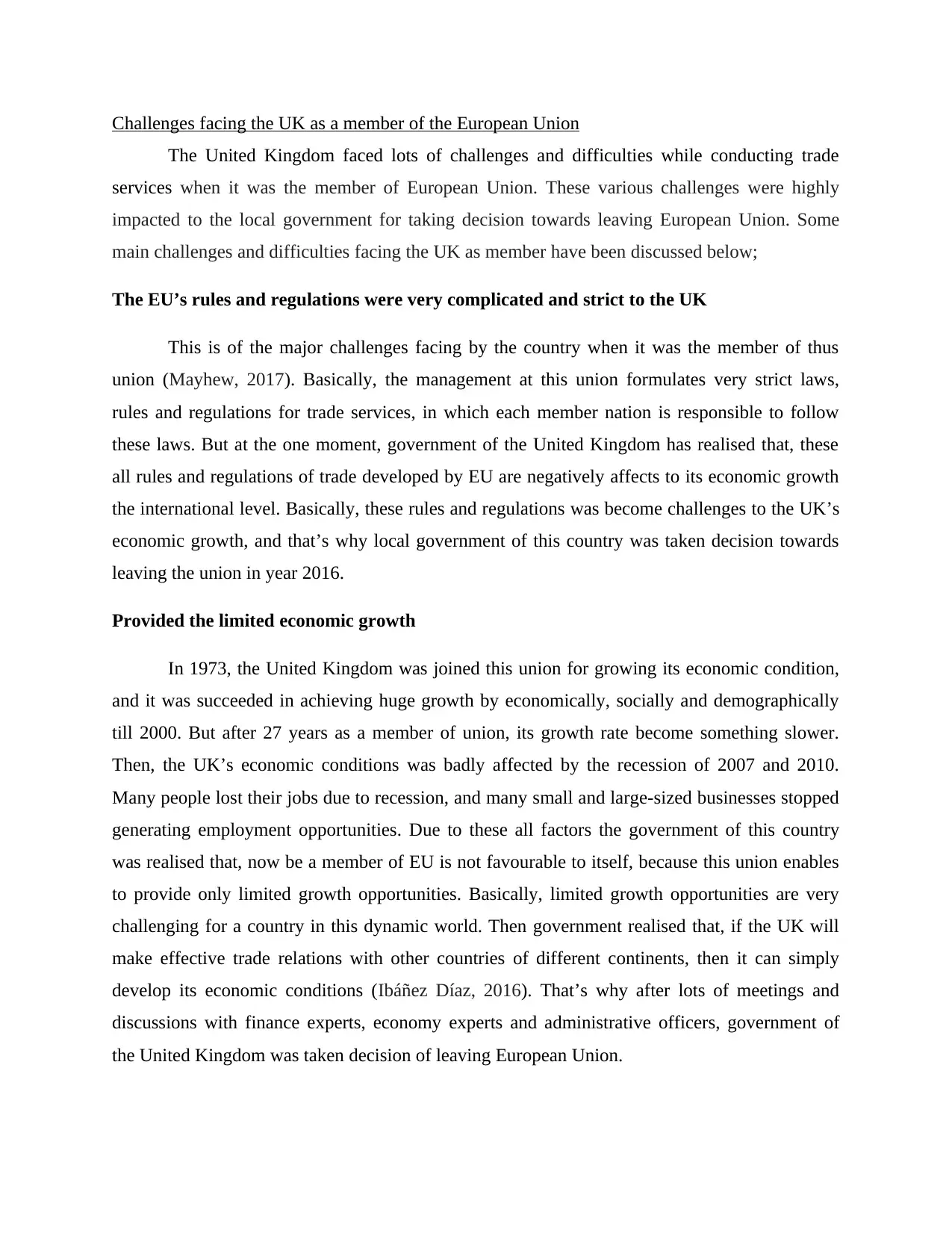
Challenges facing the UK as a member of the European Union
The United Kingdom faced lots of challenges and difficulties while conducting trade
services when it was the member of European Union. These various challenges were highly
impacted to the local government for taking decision towards leaving European Union. Some
main challenges and difficulties facing the UK as member have been discussed below;
The EU’s rules and regulations were very complicated and strict to the UK
This is of the major challenges facing by the country when it was the member of thus
union (Mayhew, 2017). Basically, the management at this union formulates very strict laws,
rules and regulations for trade services, in which each member nation is responsible to follow
these laws. But at the one moment, government of the United Kingdom has realised that, these
all rules and regulations of trade developed by EU are negatively affects to its economic growth
the international level. Basically, these rules and regulations was become challenges to the UK’s
economic growth, and that’s why local government of this country was taken decision towards
leaving the union in year 2016.
Provided the limited economic growth
In 1973, the United Kingdom was joined this union for growing its economic condition,
and it was succeeded in achieving huge growth by economically, socially and demographically
till 2000. But after 27 years as a member of union, its growth rate become something slower.
Then, the UK’s economic conditions was badly affected by the recession of 2007 and 2010.
Many people lost their jobs due to recession, and many small and large-sized businesses stopped
generating employment opportunities. Due to these all factors the government of this country
was realised that, now be a member of EU is not favourable to itself, because this union enables
to provide only limited growth opportunities. Basically, limited growth opportunities are very
challenging for a country in this dynamic world. Then government realised that, if the UK will
make effective trade relations with other countries of different continents, then it can simply
develop its economic conditions (Ibáñez Díaz, 2016). That’s why after lots of meetings and
discussions with finance experts, economy experts and administrative officers, government of
the United Kingdom was taken decision of leaving European Union.
The United Kingdom faced lots of challenges and difficulties while conducting trade
services when it was the member of European Union. These various challenges were highly
impacted to the local government for taking decision towards leaving European Union. Some
main challenges and difficulties facing the UK as member have been discussed below;
The EU’s rules and regulations were very complicated and strict to the UK
This is of the major challenges facing by the country when it was the member of thus
union (Mayhew, 2017). Basically, the management at this union formulates very strict laws,
rules and regulations for trade services, in which each member nation is responsible to follow
these laws. But at the one moment, government of the United Kingdom has realised that, these
all rules and regulations of trade developed by EU are negatively affects to its economic growth
the international level. Basically, these rules and regulations was become challenges to the UK’s
economic growth, and that’s why local government of this country was taken decision towards
leaving the union in year 2016.
Provided the limited economic growth
In 1973, the United Kingdom was joined this union for growing its economic condition,
and it was succeeded in achieving huge growth by economically, socially and demographically
till 2000. But after 27 years as a member of union, its growth rate become something slower.
Then, the UK’s economic conditions was badly affected by the recession of 2007 and 2010.
Many people lost their jobs due to recession, and many small and large-sized businesses stopped
generating employment opportunities. Due to these all factors the government of this country
was realised that, now be a member of EU is not favourable to itself, because this union enables
to provide only limited growth opportunities. Basically, limited growth opportunities are very
challenging for a country in this dynamic world. Then government realised that, if the UK will
make effective trade relations with other countries of different continents, then it can simply
develop its economic conditions (Ibáñez Díaz, 2016). That’s why after lots of meetings and
discussions with finance experts, economy experts and administrative officers, government of
the United Kingdom was taken decision of leaving European Union.
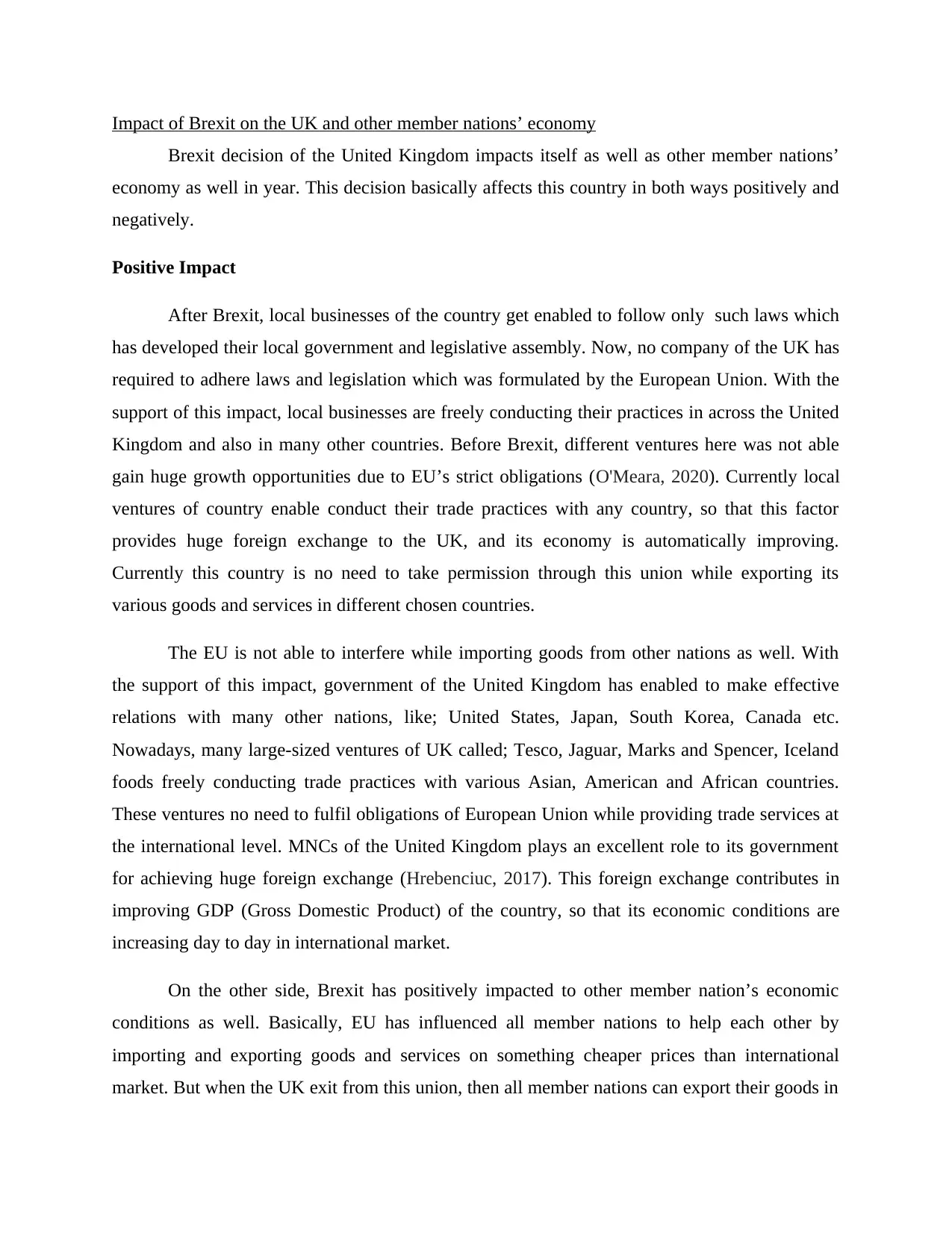
Impact of Brexit on the UK and other member nations’ economy
Brexit decision of the United Kingdom impacts itself as well as other member nations’
economy as well in year. This decision basically affects this country in both ways positively and
negatively.
Positive Impact
After Brexit, local businesses of the country get enabled to follow only such laws which
has developed their local government and legislative assembly. Now, no company of the UK has
required to adhere laws and legislation which was formulated by the European Union. With the
support of this impact, local businesses are freely conducting their practices in across the United
Kingdom and also in many other countries. Before Brexit, different ventures here was not able
gain huge growth opportunities due to EU’s strict obligations (O'Meara, 2020). Currently local
ventures of country enable conduct their trade practices with any country, so that this factor
provides huge foreign exchange to the UK, and its economy is automatically improving.
Currently this country is no need to take permission through this union while exporting its
various goods and services in different chosen countries.
The EU is not able to interfere while importing goods from other nations as well. With
the support of this impact, government of the United Kingdom has enabled to make effective
relations with many other nations, like; United States, Japan, South Korea, Canada etc.
Nowadays, many large-sized ventures of UK called; Tesco, Jaguar, Marks and Spencer, Iceland
foods freely conducting trade practices with various Asian, American and African countries.
These ventures no need to fulfil obligations of European Union while providing trade services at
the international level. MNCs of the United Kingdom plays an excellent role to its government
for achieving huge foreign exchange (Hrebenciuc, 2017). This foreign exchange contributes in
improving GDP (Gross Domestic Product) of the country, so that its economic conditions are
increasing day to day in international market.
On the other side, Brexit has positively impacted to other member nation’s economic
conditions as well. Basically, EU has influenced all member nations to help each other by
importing and exporting goods and services on something cheaper prices than international
market. But when the UK exit from this union, then all member nations can export their goods in
Brexit decision of the United Kingdom impacts itself as well as other member nations’
economy as well in year. This decision basically affects this country in both ways positively and
negatively.
Positive Impact
After Brexit, local businesses of the country get enabled to follow only such laws which
has developed their local government and legislative assembly. Now, no company of the UK has
required to adhere laws and legislation which was formulated by the European Union. With the
support of this impact, local businesses are freely conducting their practices in across the United
Kingdom and also in many other countries. Before Brexit, different ventures here was not able
gain huge growth opportunities due to EU’s strict obligations (O'Meara, 2020). Currently local
ventures of country enable conduct their trade practices with any country, so that this factor
provides huge foreign exchange to the UK, and its economy is automatically improving.
Currently this country is no need to take permission through this union while exporting its
various goods and services in different chosen countries.
The EU is not able to interfere while importing goods from other nations as well. With
the support of this impact, government of the United Kingdom has enabled to make effective
relations with many other nations, like; United States, Japan, South Korea, Canada etc.
Nowadays, many large-sized ventures of UK called; Tesco, Jaguar, Marks and Spencer, Iceland
foods freely conducting trade practices with various Asian, American and African countries.
These ventures no need to fulfil obligations of European Union while providing trade services at
the international level. MNCs of the United Kingdom plays an excellent role to its government
for achieving huge foreign exchange (Hrebenciuc, 2017). This foreign exchange contributes in
improving GDP (Gross Domestic Product) of the country, so that its economic conditions are
increasing day to day in international market.
On the other side, Brexit has positively impacted to other member nation’s economic
conditions as well. Basically, EU has influenced all member nations to help each other by
importing and exporting goods and services on something cheaper prices than international
market. But when the UK exit from this union, then all member nations can export their goods in
⊘ This is a preview!⊘
Do you want full access?
Subscribe today to unlock all pages.

Trusted by 1+ million students worldwide
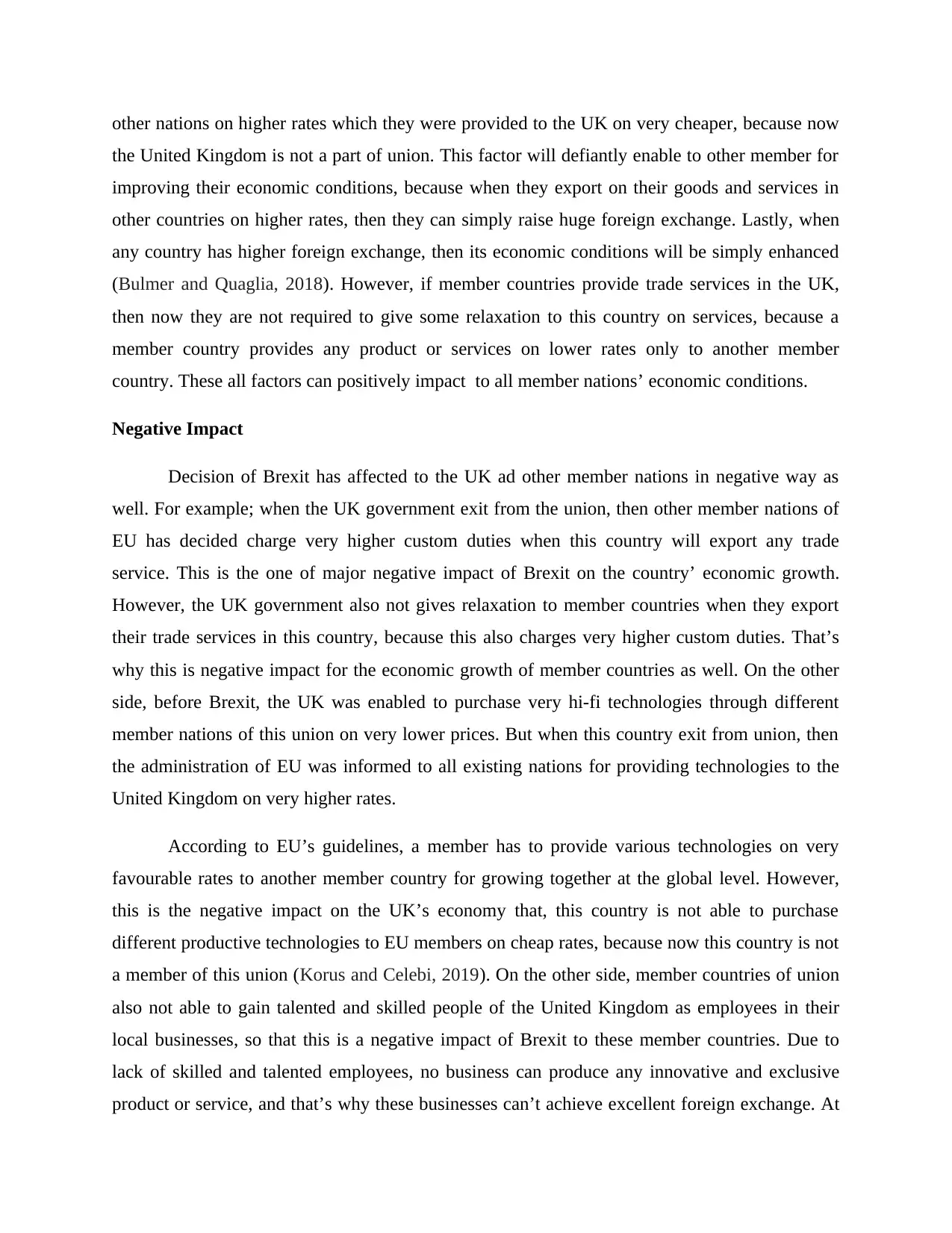
other nations on higher rates which they were provided to the UK on very cheaper, because now
the United Kingdom is not a part of union. This factor will defiantly enable to other member for
improving their economic conditions, because when they export on their goods and services in
other countries on higher rates, then they can simply raise huge foreign exchange. Lastly, when
any country has higher foreign exchange, then its economic conditions will be simply enhanced
(Bulmer and Quaglia, 2018). However, if member countries provide trade services in the UK,
then now they are not required to give some relaxation to this country on services, because a
member country provides any product or services on lower rates only to another member
country. These all factors can positively impact to all member nations’ economic conditions.
Negative Impact
Decision of Brexit has affected to the UK ad other member nations in negative way as
well. For example; when the UK government exit from the union, then other member nations of
EU has decided charge very higher custom duties when this country will export any trade
service. This is the one of major negative impact of Brexit on the country’ economic growth.
However, the UK government also not gives relaxation to member countries when they export
their trade services in this country, because this also charges very higher custom duties. That’s
why this is negative impact for the economic growth of member countries as well. On the other
side, before Brexit, the UK was enabled to purchase very hi-fi technologies through different
member nations of this union on very lower prices. But when this country exit from union, then
the administration of EU was informed to all existing nations for providing technologies to the
United Kingdom on very higher rates.
According to EU’s guidelines, a member has to provide various technologies on very
favourable rates to another member country for growing together at the global level. However,
this is the negative impact on the UK’s economy that, this country is not able to purchase
different productive technologies to EU members on cheap rates, because now this country is not
a member of this union (Korus and Celebi, 2019). On the other side, member countries of union
also not able to gain talented and skilled people of the United Kingdom as employees in their
local businesses, so that this is a negative impact of Brexit to these member countries. Due to
lack of skilled and talented employees, no business can produce any innovative and exclusive
product or service, and that’s why these businesses can’t achieve excellent foreign exchange. At
the United Kingdom is not a part of union. This factor will defiantly enable to other member for
improving their economic conditions, because when they export on their goods and services in
other countries on higher rates, then they can simply raise huge foreign exchange. Lastly, when
any country has higher foreign exchange, then its economic conditions will be simply enhanced
(Bulmer and Quaglia, 2018). However, if member countries provide trade services in the UK,
then now they are not required to give some relaxation to this country on services, because a
member country provides any product or services on lower rates only to another member
country. These all factors can positively impact to all member nations’ economic conditions.
Negative Impact
Decision of Brexit has affected to the UK ad other member nations in negative way as
well. For example; when the UK government exit from the union, then other member nations of
EU has decided charge very higher custom duties when this country will export any trade
service. This is the one of major negative impact of Brexit on the country’ economic growth.
However, the UK government also not gives relaxation to member countries when they export
their trade services in this country, because this also charges very higher custom duties. That’s
why this is negative impact for the economic growth of member countries as well. On the other
side, before Brexit, the UK was enabled to purchase very hi-fi technologies through different
member nations of this union on very lower prices. But when this country exit from union, then
the administration of EU was informed to all existing nations for providing technologies to the
United Kingdom on very higher rates.
According to EU’s guidelines, a member has to provide various technologies on very
favourable rates to another member country for growing together at the global level. However,
this is the negative impact on the UK’s economy that, this country is not able to purchase
different productive technologies to EU members on cheap rates, because now this country is not
a member of this union (Korus and Celebi, 2019). On the other side, member countries of union
also not able to gain talented and skilled people of the United Kingdom as employees in their
local businesses, so that this is a negative impact of Brexit to these member countries. Due to
lack of skilled and talented employees, no business can produce any innovative and exclusive
product or service, and that’s why these businesses can’t achieve excellent foreign exchange. At
Paraphrase This Document
Need a fresh take? Get an instant paraphrase of this document with our AI Paraphraser
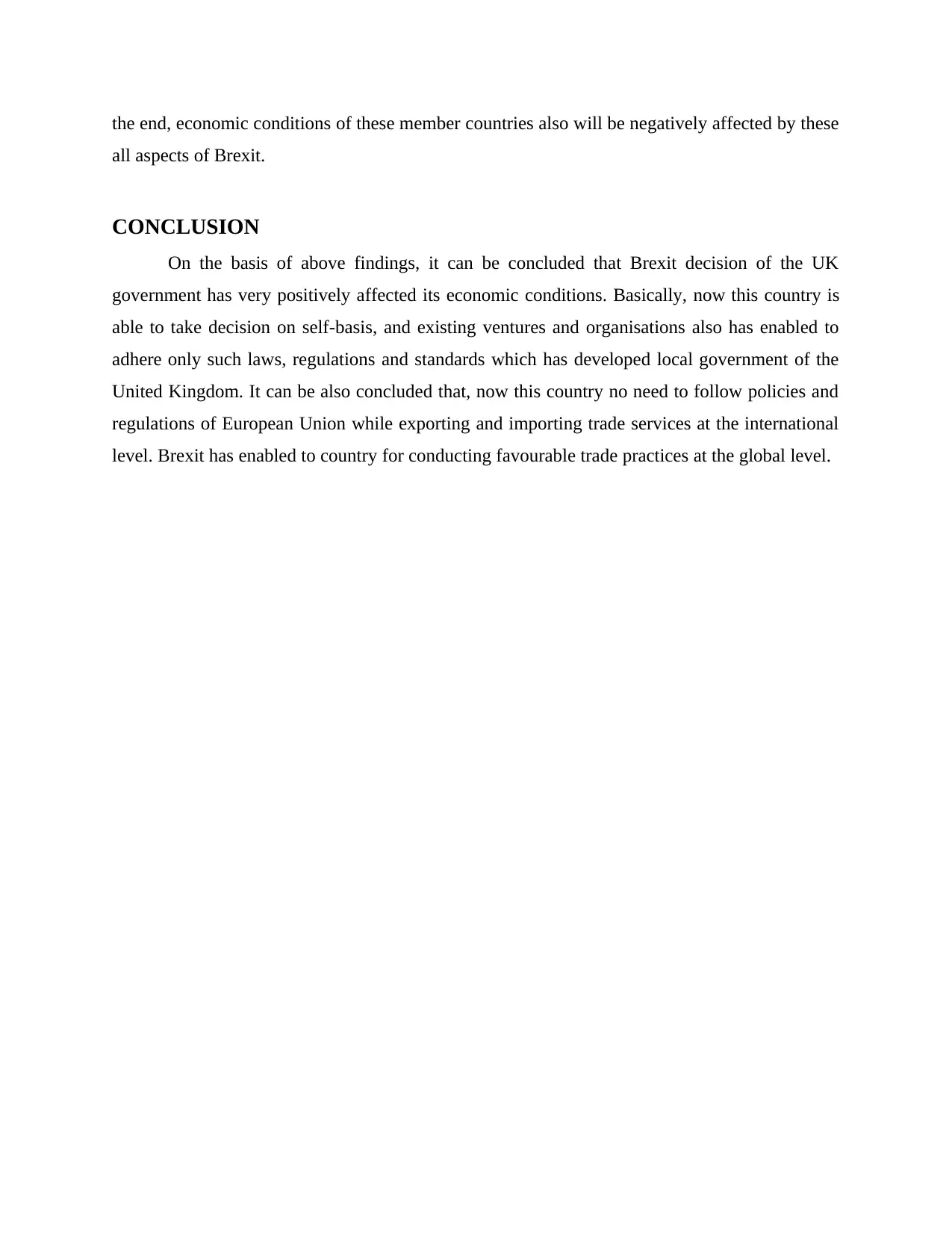
the end, economic conditions of these member countries also will be negatively affected by these
all aspects of Brexit.
CONCLUSION
On the basis of above findings, it can be concluded that Brexit decision of the UK
government has very positively affected its economic conditions. Basically, now this country is
able to take decision on self-basis, and existing ventures and organisations also has enabled to
adhere only such laws, regulations and standards which has developed local government of the
United Kingdom. It can be also concluded that, now this country no need to follow policies and
regulations of European Union while exporting and importing trade services at the international
level. Brexit has enabled to country for conducting favourable trade practices at the global level.
all aspects of Brexit.
CONCLUSION
On the basis of above findings, it can be concluded that Brexit decision of the UK
government has very positively affected its economic conditions. Basically, now this country is
able to take decision on self-basis, and existing ventures and organisations also has enabled to
adhere only such laws, regulations and standards which has developed local government of the
United Kingdom. It can be also concluded that, now this country no need to follow policies and
regulations of European Union while exporting and importing trade services at the international
level. Brexit has enabled to country for conducting favourable trade practices at the global level.
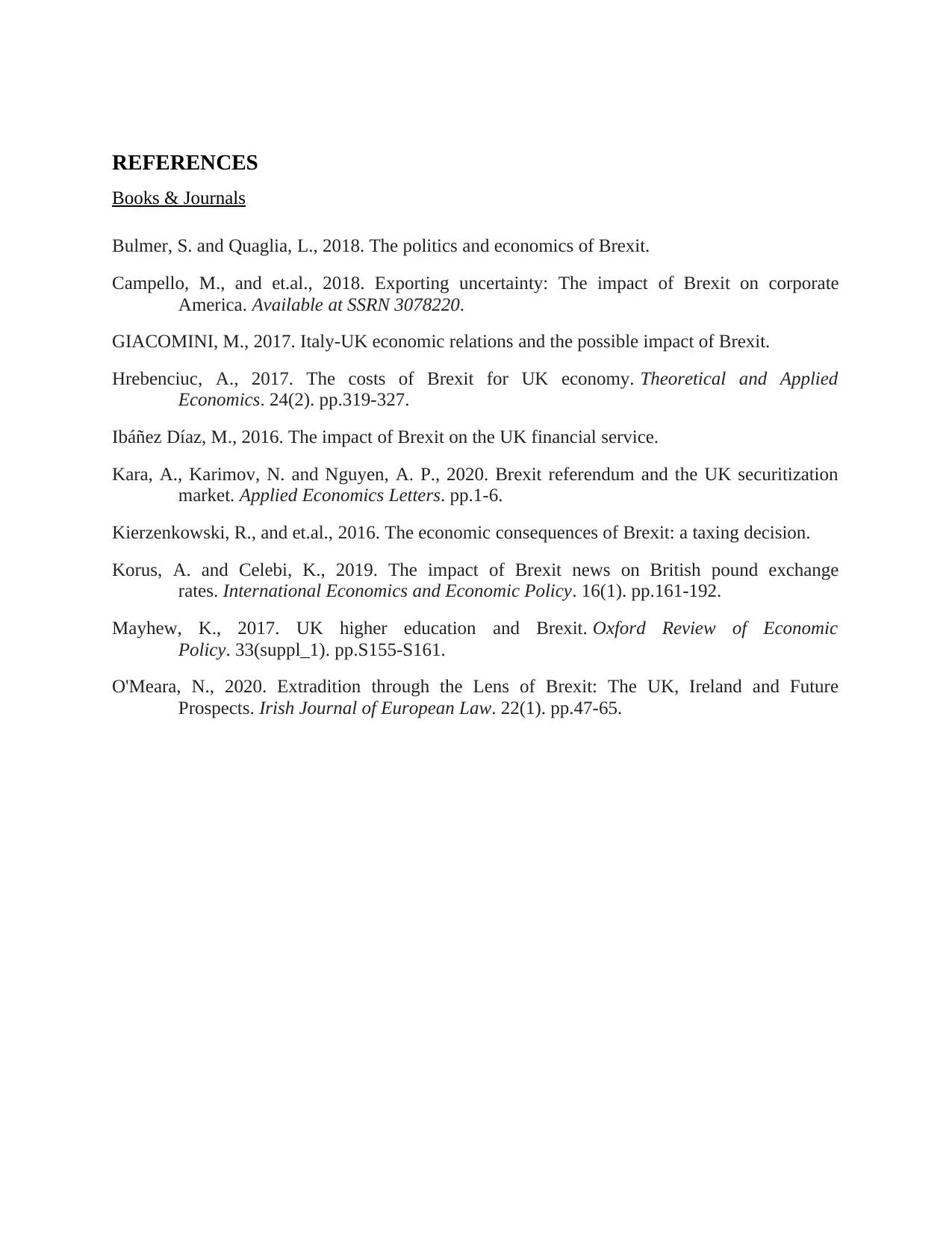
REFERENCES
Books & Journals
Bulmer, S. and Quaglia, L., 2018. The politics and economics of Brexit.
Campello, M., and et.al., 2018. Exporting uncertainty: The impact of Brexit on corporate
America. Available at SSRN 3078220.
GIACOMINI, M., 2017. Italy-UK economic relations and the possible impact of Brexit.
Hrebenciuc, A., 2017. The costs of Brexit for UK economy. Theoretical and Applied
Economics. 24(2). pp.319-327.
Ibáñez Díaz, M., 2016. The impact of Brexit on the UK financial service.
Kara, A., Karimov, N. and Nguyen, A. P., 2020. Brexit referendum and the UK securitization
market. Applied Economics Letters. pp.1-6.
Kierzenkowski, R., and et.al., 2016. The economic consequences of Brexit: a taxing decision.
Korus, A. and Celebi, K., 2019. The impact of Brexit news on British pound exchange
rates. International Economics and Economic Policy. 16(1). pp.161-192.
Mayhew, K., 2017. UK higher education and Brexit. Oxford Review of Economic
Policy. 33(suppl_1). pp.S155-S161.
O'Meara, N., 2020. Extradition through the Lens of Brexit: The UK, Ireland and Future
Prospects. Irish Journal of European Law. 22(1). pp.47-65.
Books & Journals
Bulmer, S. and Quaglia, L., 2018. The politics and economics of Brexit.
Campello, M., and et.al., 2018. Exporting uncertainty: The impact of Brexit on corporate
America. Available at SSRN 3078220.
GIACOMINI, M., 2017. Italy-UK economic relations and the possible impact of Brexit.
Hrebenciuc, A., 2017. The costs of Brexit for UK economy. Theoretical and Applied
Economics. 24(2). pp.319-327.
Ibáñez Díaz, M., 2016. The impact of Brexit on the UK financial service.
Kara, A., Karimov, N. and Nguyen, A. P., 2020. Brexit referendum and the UK securitization
market. Applied Economics Letters. pp.1-6.
Kierzenkowski, R., and et.al., 2016. The economic consequences of Brexit: a taxing decision.
Korus, A. and Celebi, K., 2019. The impact of Brexit news on British pound exchange
rates. International Economics and Economic Policy. 16(1). pp.161-192.
Mayhew, K., 2017. UK higher education and Brexit. Oxford Review of Economic
Policy. 33(suppl_1). pp.S155-S161.
O'Meara, N., 2020. Extradition through the Lens of Brexit: The UK, Ireland and Future
Prospects. Irish Journal of European Law. 22(1). pp.47-65.
⊘ This is a preview!⊘
Do you want full access?
Subscribe today to unlock all pages.

Trusted by 1+ million students worldwide
1 out of 9
Related Documents
Your All-in-One AI-Powered Toolkit for Academic Success.
+13062052269
info@desklib.com
Available 24*7 on WhatsApp / Email
![[object Object]](/_next/static/media/star-bottom.7253800d.svg)
Unlock your academic potential
Copyright © 2020–2025 A2Z Services. All Rights Reserved. Developed and managed by ZUCOL.





